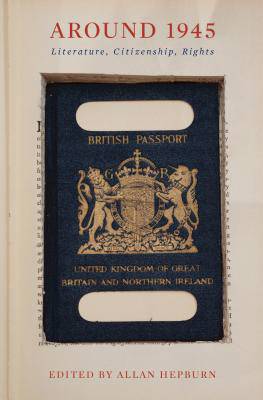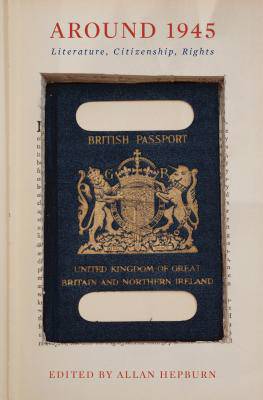
Door een staking bij bpost kan je online bestelling op dit moment iets langer onderweg zijn dan voorzien. Dringend iets nodig? Onze winkels ontvangen jou met open armen!
- Afhalen na 1 uur in een winkel met voorraad
- Gratis thuislevering in België vanaf € 30
- Ruim aanbod met 7 miljoen producten
Door een staking bij bpost kan je online bestelling op dit moment iets langer onderweg zijn dan voorzien. Dringend iets nodig? Onze winkels ontvangen jou met open armen!
- Afhalen na 1 uur in een winkel met voorraad
- Gratis thuislevering in België vanaf € 30
- Ruim aanbod met 7 miljoen producten
Zoeken
€ 177,45
+ 354 punten
Uitvoering
Omschrijving
Near the end of the Second World War, new ideas about citizenship, national identity, belonging, and rights emerged as the atrocities of the war - coupled with the dropping of atomic bombs on Hiroshima and Nagasaki - spurred writers and citizens around the world to think about their responsibilities to their fellow man. Covering British authors and contemporary fiction by migrant writers publishing at mid-century, as well as some photography from the era, Around 1945 is a collection of essays that reveals how literary texts and cultural events modeled human rights issues such as dignity, freedom, sovereignty, and responsibility. Unified by an investigation of the human and cultural aspects of universal rights, these essays show that British writers tested the parameters of citizenship and rights in novelistic form. By imagining duties and rights of citizens in hypothetical contexts, these novels expanded on the legislated entitlements and obligations that make up civic and human identity. To this day the repercussions of 1945 continue to unfold in stories about statehood, refugees, humanitarianism, displacement, and national belonging. At the same time, novels continue to imagine the human person, equal in rights and dignity before the law, yet often compromised by the political exigencies of nation-states that do not recognize legal, political, or human rights. Tracing the rippling consequences of the Second World War from 1945 through the Cold War and into the present, Around 1945 is an extraordinarily rich volume that will alter our perception of pre- and post-war British literature. Contributors include Nadine Attewell (McMaster), Mitchell C. Brown (Dalhousie), Matthew Hart (Columbia), Janice Ho (Colorado), Emily Hyde (Rowan), Peter Kalliney (Kentucky), Marina MacKay (Oxford), Melanie Micir (Washington, St. Louis), Adam Piette (Sheffield) Claire Seiler (Dickinson College), and Ian Whittington (Mississippi).
Specificaties
Betrokkenen
- Auteur(s):
- Uitgeverij:
Inhoud
- Aantal bladzijden:
- 328
- Taal:
- Engels
Eigenschappen
- Productcode (EAN):
- 9780773547315
- Verschijningsdatum:
- 30/05/2016
- Uitvoering:
- Hardcover
- Formaat:
- Genaaid
- Afmetingen:
- 152 mm x 231 mm
- Gewicht:
- 589 g

Alleen bij Standaard Boekhandel
+ 354 punten op je klantenkaart van Standaard Boekhandel
Beoordelingen
We publiceren alleen reviews die voldoen aan de voorwaarden voor reviews. Bekijk onze voorwaarden voor reviews.











